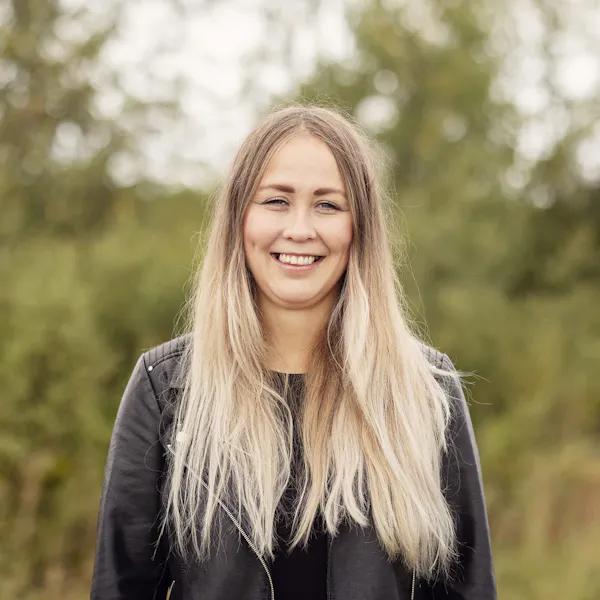
EadnámetMaid continues in Kalaallit Nunaat
Violence against nature – does it affect people and health? Dáiddadállu continues with important conversations during EadnámetMaid! the project which is now being arranged at the Greenland and Nuuk Nordic Culture Festival.
EadnámetMaid is an event where art and conversation are in focus. Through art and conversations, artists raise important and current topics in our society. Mining and wind turbines are hot topics that both individuals and the Sami community have struggled with for a long time. Artists see a need to elevate the human aspects in these matters. How do encroachments on nature affect people and health?
– Abuse of nature has no boundaries and it affects our lives, living conditions and also our thoughts. We have to talk more about this, says Dáiddadállus’ subject leader, Máret Anne Sara.

Máret Ánne Sara. Photo: Marie Louise Somby/Árvu
Digital solutions provided new opportunities
Originally, last year EadnámetMaid was to bring together artists, academia, politicians and others from all over Sápmi, and the indigenous artists in a 4-day packed program with exhibitions, talks, presentations, performances and concerts. As the corona situation in the county was out of control with the spread and closure of hospitals, the entire program had to be changed just weeks before.
– We had to carry out a hybrid event by limiting the event to local participation only and inviting the world in through the digital channels. We had participants from all over Sápmi; south, east, west and north, in addition to participants of other indigenous peoples. Together with our partners in KulturSápmi, the Sami Council introduced a digital collaboration that none of us had much experience with in program production. But with combined efforts and technical assistance, we conducted a fantastically nice, digital collection where the theme of the project was worthily illuminated according to the circumstances and we are very pleased with the result in the first part. Now as last year, some participate via stream and others at the festival. We have gained good experiences with arranging digital meetings and can happily say that EadnámetMaid part II can be followed via stream, says Dine Arnannguaq Fenger Lynge, Daiddadallus managing director.
Valuable collaboration with our indigenous sisters and brothers
Indigenous peoples around the world are experiencing challenges from climate change and abuses of nature. – In these cases, the impacts on indigenous societies are enormous because our culture and primary industries are so strongly linked to nature. Because we have the same challenges, it is important to communicate and think together and work with other indigenous peoples, says Máret Ánne Sara.
– We were to invite artists from Kalaallit Nunaat to last year’s EadnámetMaid in Sápmi, but due to covid they could not travel to Norway. Now we finally get to meet at Nuuk and in that way build networks and collaborations that we see as very valuable, says Dine Arnannquaq Fenger Lynge.

Dine Arnannguaq Fenger Lynge. Photo: Marie Louise Somby/Árvu
Nuuk Nordic Talk Stage
Nuuk Nordic is Greenland’s largest culture and art festival, which is held every other year. Dáiddadállu is involved in arranging the conversation arena NNK Talk Stage where artists, researchers and others meet. The program under “EadnámetMaid – NunarputAamma- The LandToo ” includes conversations, posts, artistic performances and film screenings. – This will be incredibly exciting, says Lynge.
Program
Nuuk Nordic Culture Festival opens next Thursday 28.10 and lasts until 31.10:
EadnámetMaid 28.10
12:35
- Presentation of Dáiddadállu by Dine Arnannguaq Fenger Lynge
- Presentation of EadnámetMaid by producer Maren Benedicte Nystad Storslett
- Digital greetings from Mari Boine
- Digital greetings from Silje Karine Muotka, president of Sámi Parliament in Norway
- KlimaTerra by Anitta Suikkari and Hilde Skancke Pedersen- An artistisk walkthrough
13:40
- Screening of Ealát by Elle Márjá Eira
- Q&A with Elle Márjá Eira and Ánne Kátjá Gaup
14:25 De språkløse
15:00 EadnámetMaid:
Violence and abuse against nature. How does it affect mental health, especially in indigenous societies?
- Marit Anne Sara: Pile O Sápmi presentation
- Sunna Nousuniemi: Screening: “Gáidat/Máhccat”
- Talk between artists Máret Ánne Sara, Sunna Nousuniemi, Dine Arnannguaq Fenger Lynge, Ivinnguaq Storck Høegh.
Friday 29th October Reflecting NNK
14:15 Sculptures Elle Márjá Eira, Jeannette Ehlers, Lill Frederiksen Chemnitz Moderated by Mathias Danbolt
Saturday 30th October Reflecting NNK
13:15 – 14:00 Self organization/Self-determintation in cultural programs
- Dine Arnannguaq Fenger Lynge, Dáiddadállu
- Jonas Nilsson, Nuuk Nordisk
- Moderatorated by Sandra Marja West, RidduRiddu
15:15 -16:30 MÁZE AND MÁZEJOAVKU
Presentation of Susanne Hætta
Talk between Hans Ragnar Mathisen, Jessie Kleeman, Susanne Hætta, Joar Nango
Screening of Dál lea doarvái / Nok er nok / Enough is enough by Gunilla Bresky and Ken Are Bongo
EadnámetMaid’ is conceived and organised by Dáiddadállu, with the support and collaboration of the Sámi Parliament in Norway and the Office for Contemporary Art Norway (OCA) , and is a continuation of their long-term engagement with the town of Máze, iconic in recent Sámi political history, and its advocacy for the establishment of an international Indigenous artist residency there. Saturday 30.october 15:15 -16:30 (11:15 – 12:10 Norwegian time) Susanne Hætta will highlight the long term engagement with a digital presentation of the book Mázejoavku and having a talk with Hans Ragnar Mathisen,Jessie Kleeman and moderated by Joar Nango Following by screening of the film of Mázejoavku Dál lea doarvái / Nok er nok / enough is enough by Gunilla Bresky.
EadnámetMaid is funded by Sametinget, Office for Contemporary Art Norway, Norsk Kulturråd, Nordisk Kulturfond, Fritt Ord, KORO (Kunst i offentlig rom), Nordnorsk Kunstnersenter and Troms og Finnmark Fylkeskommune.




